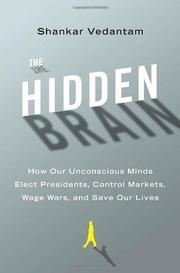
|
The hidden brain
|
Shankar Vedantam |
Most of us would agree that there's a clear--and even obvious--connection between the things we believe and the way we behave. But what if our actions are driven not by our conscious values and belie… |
OL10248392W |
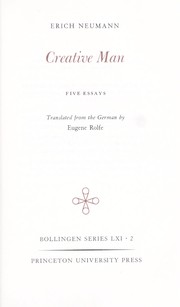
|
Creative Man
|
Erich Neumann |
This selection of essays by one of C. G. Jung's favorite and most creative students explores important connections between analytical psychology and the study of literature and art.
Jordan B. Pet… |
OL1571364W |
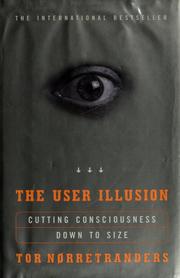
|
The user illusion
|
Tor Nørretranders |
The author asserts that "what our consciousness rejects constitutes the most valuable part of ourselves," and that "we have to get outside and live life fully with all our senses to experience it mor… |
OL15846581W |
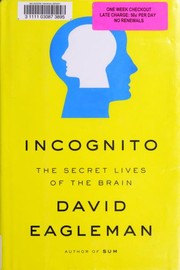
|
Incognito
|
David Eagleman |
"This book will shine light on some of the hard-to-reach places in the brain, showing the ways in which we are not the ones driving the boat. Why does the conscious mind know so little? What do visua… |
OL15999455W |
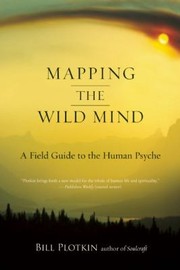
|
Wild Mind A Field Guide To The Human Psyche
|
Bill Plotkin |
Our human psyches possess astonishing resources that wait within us, but we might not even know they exist until we discover how to access them and cultivate their powers, their untapped potentials a… |
OL17582537W |
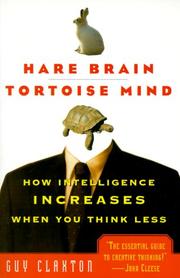
|
Hare Brain, Tortoise Mind
|
Guy Claxton |
Argues that the mind works best when people trust the unconscious and calls for a reevaluation of society's obsession with results-oriented thinking and solving problems under pressure |
OL1866300W |

|
The elephant in the brain
|
Kevin Simler |
"This book exposes our unconscious selfish motives, those we're reluctant to discuss or even think about. These motives drive our body language, laughter, and conversation, as well as venerated insti… |
OL19728362W |
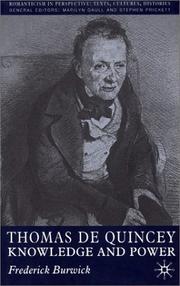
|
Thomas De Quincey
|
Frederick Burwick |
"This book examines what De Quincey called 'psychological criticism', a mode of studying the 'power' of Shakespeare and Wordsworth, tracing the effects upon the subconscious. That psychological groun… |
OL19820522W |

|
The Subconscious
|
Felicia Drury Kliment |
Life is a constant process of growth: evaluating what you've done, noting your mistakes, making the necessary adjustments, reevaluating, and starting all over again. Throughout this cycle, the "perso… |
OL19981800W |

|
Broken
|
Elizabeth Pulford |
Critically injured and lying in a coma, Zara Wilson is caught between the world of her hospital room and the world of her subconscious, which includes painful memories, distant voices, and a search f… |
OL20911496W |

|
Power of Archetypes
|
Marie D. Jones |
1 online resource |
OL21308854W |

|
La neurophilosophie
|
Que sais-je?,Bernard Andrieu |
Etablit les conditions d'un dialogue entre la philosophie et les neurosciences de 1970 à nos jours qui sont, ici, analysées en mettant en avant la neurophilosophie américaine et les matérialismes du … |
OL28589547W |
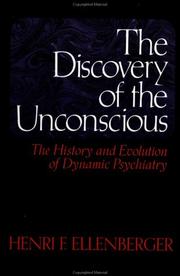
|
The discovery of the unconscious
|
Henri F. Ellenberger |
In this study of the history of dynamic psychiatry, Ellenberger provides an account of the early history of psychology covering such figures as Franz Anton Mesmer, Sigmund Freud, Carl Jung, Alfred Ad… |
OL4319347W |
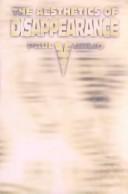
|
Esthétique de la disparition
|
Paul Virilio |
Virilio introduces his understanding of "picnolepsy" — the epileptic state of consciousness produced by speed.
Virilio himself referred to his 1980 work <em>The Aesthetics of Disappearance</em> as… |
OL542658W |
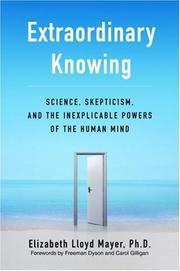
|
Extraordinary Knowing
|
Elizabeth Lloyd Mayer |
In 1991, when her daughter's rare, hand-carved harp was stolen, Lisby Mayer's familiar world of science and rational thinking turned upside down. After the police failed to turn up any leads, a frien… |
OL6992685W |
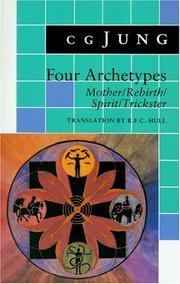
|
Four Archetypes
|
Carl Gustav Jung |
The concept of the archetype is crucial to Jung's radical interpretation of the human mind. Jung believed that every person partakes of a universal or collective unconscious that persists through gen… |
OL95087W |
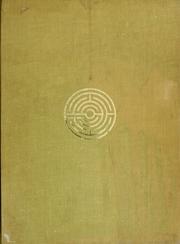
|
Man and His Symbols
|
Carl Gustav Jung |
Excerpt from back cover:
"This book, which was the last piece of work undertaken by Jung before his death in 1961, provides a unique opportunity to assess his contribution to the life and thought … |
OL95157W |
















